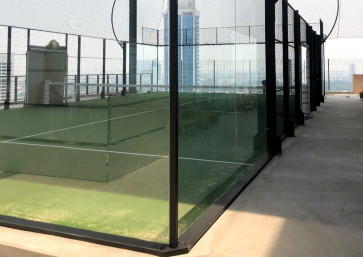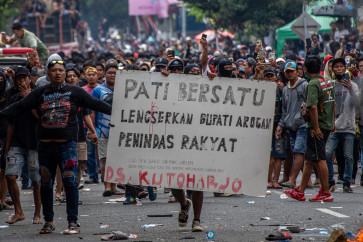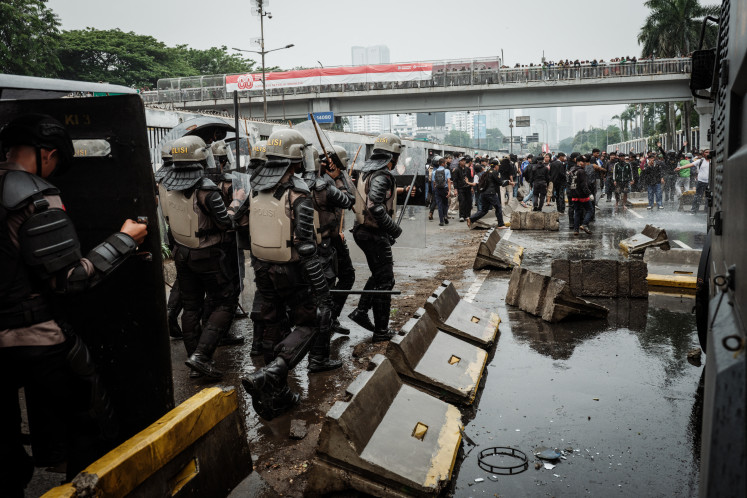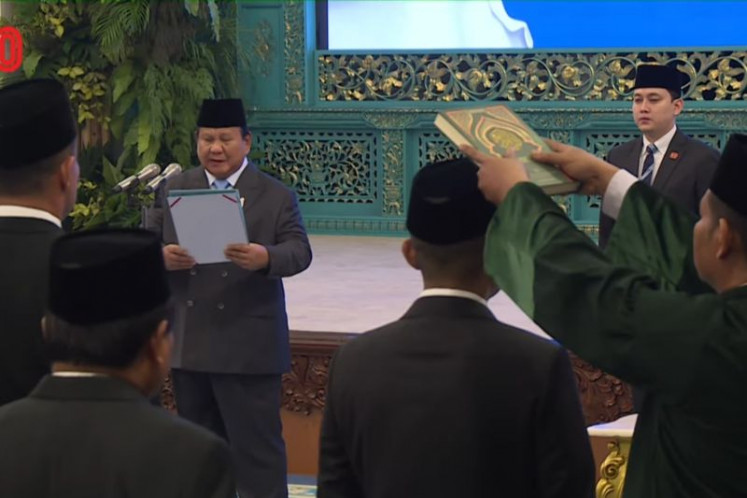Popular Reads
Top Results
Can't find what you're looking for?
View all search resultsPopular Reads
Top Results
Can't find what you're looking for?
View all search results'Waria' face growing hostility from neighbors amid increasing anti-LGBT sentiments
Growing anti-LGBT sentiment has also forced the annual Miss Waria beauty pageant to be conducted in secret, when it used to be held out in the open.
Change text size
Gift Premium Articles
to Anyone
N
irmala, not her real name, recalled how easy it was to mingle with people of the community she was living in despite being a waria (transgender woman).
The 23-year-old used to casually talk with her neighbors in Jakarta, where she has been living since migrating from her hometown in Wonogiri, Central Java, five years ago. But she feels the growing prejudice against her and has become more isolated.
“They don’t even accept our monthly garbage fees now, so I just give them directly to the garbage collector on duty,” she said.
The rejection and hostility against members of the Lesbian, Gay, Bisexual and Transgender (LGBT) community are worsening in the Muslim-majority country, where they often become objects of persecution and state-sponsored raids, though no laws have been made against them.
A survey commissioned by Jakarta-based pollster Saiful Mujani Research and Consulting (SMRC) revealed in January that 87.6 percent of more than 1,200 respondents consider the LGBT community a threat, while 81.5 percent believe it goes against their religion.
Regional administrations and government officials often issue regulations and statements that strip LGBT people of their rights. The Depok administration in West Java, for instance, has issued an anti-LGBT task force in what they claim to be an attempt to “cure” the minority group.
In Jakarta, seven transgender people in Sumur Utara, Klender, East Jakarta, have been told by residents to leave a boarding house they have lived in for years.
“We, Kampung Sumur residents, reject the presence of LGBT groups,” reads a banner raised in front of the boarding house. Similar signs can be found in other parts of the area.
Some 200 residents from four neighborhood units (RT) have signed a petition to support their expulsion. The signatures have been submitted to the subdistrict head and residents are demanding that the official take action.
RT 13 head Mamat said the protest had been initiated by officials from a nearby Mosque Welfare Council (DKM) in an attempt to prevent residents from resorting to vigilantism. The transgender women have been accused of prostitution, he added.
“This is our attempt to settle the issue. We take this step because we want to do things legally,” he told The Jakarta Post.
A resident of RT 13 who accompanied Mamat during his interview with the Post on Sunday, added: “If I was younger, I would have suggested to just burn the house down. But because I’m older now, such an idea didn’t cross my mind.”
The area is known as a strong base of the hardline Islam Defenders Front (FPI).
A transgender woman residing in the boarding house, who requested anonymity due to the sensitivity of the issue, denied accusations that the women were prostitutes.
“We have not broken any rules. We always abide by regulations set in the neighborhood, including not receiving any guests,” she said, adding that her landlady, who defended them, had been called an atheist and blamed for stirring up tension.
She has lived in the boarding house for five years; some of her friends have lived in the area for 10 years or longer and have never been threatened until now.
“We have not been physically abused so far, but we do not know what will happen,” she said.
The landlady, who also requested anonymity and is known as a devout Muslim, said she defended them because she knew they would be rejected elsewhere.
“What am I supposed to do? People say that my reputation is ruined, but I feel the need to protect them because they will not be welcomed anywhere else. It’s not about money. They are not punctual when it comes to paying their rent anyway,” she said, adding that she had developed a strong bond with them and considered them her own family.
“I know how hard their lives are and one thing’s for sure: they never forget to send money to their family,” she added.
Human Rights Watch researcher Andreas Harsono said the residents could not trespass onto the women’s private lives, as long as the landlady did not mind their presence.
Yulianus Rettoblaut, a well-known rights activist who leads the Indonesian Waria Communication Forum (FKWI), attributed the threats to rising anti-LGBT sentiment in the country, particularly ahead of the presidential and legislative elections next year, as anti-LGBT statements have been employed by politicians
to get votes.
“Our [state ideology of] Pancasila guarantees equal justice for all, but we all know transgender people always face discrimination,” she said. “Transgenders are the most vulnerable of the [LGBT] group as our physical appearance makes us easily noticeable.”
She said that when caught in raids, they were often treated harshly and even had to pay money to be freed from detention.
Growing anti-LGBT sentiment has also forced the annual Miss Waria beauty pageant to be conducted in secret, when it used to be held out in the open.
This article was originally published in The Jakarta Post's print edition on Nov. 19, 2018, with the title "‘Waria’ ostracized amid growing anti-LGBT sentiment".











